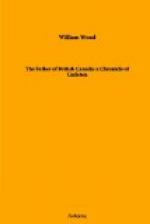The battle of Three Rivers was the last action fought on Canadian soil. The American army retreated to Sorel and up the Richelieu to St Johns, where it was joined by Arnold, who had just evacuated Montreal. Most of the Friends of Liberty in Canada fled either with or before their beaten forces. So, like the ebbing of a whole river system, the main and tributary streams of fugitives drew south towards Lake Champlain. The neutral French Canadians turned against them at once; though not to the extent of making an actual attack. The habitant cared nothing for the incomprehensible constitutionalities over which different kinds of British foreigners were fighting their exasperating civil war. But he did know what the king’s big fleet and army meant. He did begin to feel that his own ways of life were safer with the loyal than with the rebel side. And he quite understood that he had been forced to give a good deal for nothing ever since the American commissioners had authorized their famishing army to commandeer his supplies and pay him with their worthless ‘Continentals.’
From St Johns the worn-out Americans crawled homewards in stray, exhausted parties, dropping fast by the way as they went. ‘I did not look into a hut or a tent,’ wrote a horrified observer, ’in which I did not find a dead or dying man.’ Disorganization became so complete that no exact returns were ever made up. But it is known that over ten thousand armed men crossed into Canada from first to last and that not far short of half this total either found their death beyond the line or brought it back with them to Lake Champlain.
It was on what long afterwards became Dominion Day—the 1st of July—that the ruined American forces reassembled at Crown Point, having abandoned all hope of making Canada the Fourteenth Colony. Three days later the disappointed Thirteen issued the Declaration of Independence which virtually proclaimed that Canadians and Americans should thenceforth live a separate life.
CHAPTER VII
THE COUNTERSTROKE
1776-1778
Six thousand British troops, commanded by Burgoyne, and four thousand Germans, commanded by Baron Riedesel, had arrived at Quebec before the battle of Three Rivers. Quebec itself had then been left to the care of a German garrison under a German commandant, ’that excellent man, Colonel Baum,’ while the great bulk of the army had marched up the St Lawrence, as we have seen already. Such a force as this new one of Carleton’s was expected to dismay the rebel colonies. And so, to a great extent, it did. With a much larger force in the colonies themselves the king was confidently expected to master his unruly subjects, no matter how much they proclaimed their independence. The Loyalists were encouraged. The trimmers prepared to join them. Only those steadfast Americans who held their cause dearer than life itself were still determined to venture all. But they formed the one party that really knew its own mind. This gave them a great advantage over the king’s party, which, hampered at every turn by the opposition in the mother country, was never quite sure whether it ought to strike hard or gently in America.




